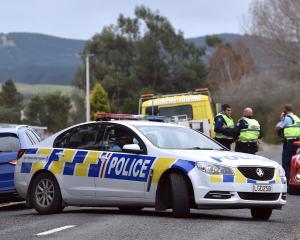"I remember you, you're the American pilot", was a common comment from those he saw.
The then 24-year-old US Air Force pilot, who suffered serious head and leg injuries after crashing while skiing at Treble Cone in July 2002, clearly made an impression on staff during his three-week stay in Dunedin Hospital before he was transferred to a veterans' hospital in California.
Now 31, Mr Ormsby, who lives in South Korea, made a brief visit to thank all those who played a part in saving his life.
Intensive care unit associate charge nurse Maree Fraser, who kept in email contact with Mr Ormsby and his family, described him as " incredibly sick" when she nursed him. Before last week, she had not heard his voice, nor had she seen him walking.
She remembered the anguish on his parents' faces when they arrived at his bedside, but she also remembered their determination.
"It was very hard to prise them away to go away and have a rest."
Mr Ormsby, who suffered a period of amnesia, paralysis down one side and could not speak following the accident, said doctors told his parents his brain stem damage was so severe he would be a vegetable, but they and he were determined that would not be the case.
Asked what made him able to overcome such a severe injury, Mr Ormsby said, "You're talking to an F16 pilot." Being disciplined, trained to fight and have attention to detail was part of it.
Also, he had "short man's complex", something which contributed to making him persistent to the point of being a "pain in the butt".
The hardest thing to cope with following the accident was loss.
He had lost his job, his comfort zone, a girlfriend and friends who could not cope with his changed situation,.
"I lost almost everything, except life."
He believed his intensive therapy programme had given him a higher IQ than he had just before the accident.
One thing that had not changed was being taken to task for mumbling - "I mumbled a great deal before the accident".
Mrs Fraser, who has been working in ICU for 14 years, said it was "a bit surreal" seeing Mr Ormsby again.
Such meetings were "the reason why we do this job. A lot of people say it must be doom and gloom, it must be horrible, but we see more good than we see bad".
Mr Ormsby, who has not been able to resume his pilot's role, will leave the air force later this year and hopes eventually to gain a new career with the North Atlantic Treaty Organisation in its Air Command and Control System Management Agency.
Despite several operations on his knees, he still skis every winter. The hardest thing about that was coping with his double vision, Mr Ormsby said.












